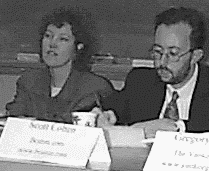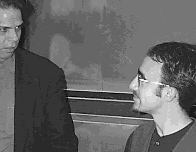Internet Plans to Repave Local Landscape

CAMBRIDGE, MA - The rumble of heavy equipment was felt on the information superhighways of eastern Massachusetts as key players from The Boston Globe, from Fidelity's Community Newspaper group, and from AOL and Yahoo!, along with local webmasters, internauts, and media types gathered at MIT for the (eastcoast) November Meeting of The WebMasters Guild.
The meetings, chaired by Mathew Cutler, eastcoast chairman of the WMG, was presented as a forum where panelists each gave a seven minute synopsis relating the local content and community aspects of thier websites (or plans for websites in some cases).
Athough terms like "grassroots efforts" and "community building", were present in the panelists messages, that fact that advertising revenue and media control are the real issues was obvious to most in attendance.
While the thought of putting a "community" online is not a new one, major online service providers are just starting to realize that while the internet allows anyone global information access, most users want a place to call home.
The focus of the forum, local content, was taken a step further by Paul DeBraccio whose GeoCities website provides users with themed communities... virtual topic based destinations where personal pages are set up by homesteaders who's interest relate to that area's topic. DeBraccio, a former ad man claims millions of hits and has partnerships with Lycos, Planet Direct, and T.V. Guide.
Trish Barber, a Regional Manager for Digital City, Inc., (an America Online Company), described how AOL plans to open up 20 metropolitan based citys on the web by the end of the year, and how the AOL cities are currently available only to members using AOL's client software, but that the new model will be HTML based and open to anyone with internet access. The Digital City plan was more focused on major metropolitan regions, and did not appear to threaten the existence of (smaller) town or city sites, in fact Barber explained that links to the (non-AOL) city and town sites would be included.
Webmasters who run sites for or about individual cities and towns in the greater Boston area attended and listened closely as the online power players discussed issues that many felt could overshadow the efforts they had made in bringing their community online. While some of big guns explained how they do plan to operate at the city/town level, not all speakers came accross as the type of competition the locals envisioned them to be. Scott Cohen, Content Manager of The Boston Globe's popular boston.com site explained how his organization works with museums, theatres, media outlets, and others, many times providing links and even entire web sites when the mix is right "with no money changing hands". The Globe's plan appeared to be more regional, with metro-region themed pages and entertainment and dining directories, but did not plan to be covering news and events town by town.
Charlene Li, Multi-Media Director for Fidelity's CNC newspaper group, a collection of daily and weekly papers with reporters and salespeople in nearly 120 towns and cities in the New England area gave contradicting statements; at times saying they were looking forward to working with the local webmasters, and at other times saying the group, owned by the massive Fidelity Investments company wanted to "keep the money in the family". Already stepping on people's toes, the Fidelity group has put up pages for towns where others have already established a town website -- none of which are mentioned anywhere on the CNC pages. Li's comments of "working together" did not ring true, and a general mistrust and dislike of the company was expressed by many we talked with. Some are questioning the ethical implications of a company like Fidelity's CNC having such financial interest and media control in a single market, and what conflicting issues relating to securities and newspaper operation will be applied to the their activities online. It appears that local webmasters may not have as much to fear from the Fidelity/CNC group's sites where pages they've put up already contain material outdated by over 30 days. The Fidelity/CNC group's mandate to control the web as they have controlled the newspaper market in the region seems doomed to failure due to the freewheeling nature of the web and the market-control tactics and attempts to eliminate competition by CNC.

Only one speaker, David Yip of Boston's South End E-ssociation, had a mission that did not include big-money interests. Yip's site, the only non-profit ".org" site represented in the panel focuses on local crime reporting, and was admittedly started as a tax write-off for Yip's commercial operation which sells sneakers over the internet.
Yahoo! felt the meeting was significant enought to send Elizabeth Collet to describe the web-indexing company's Yahoo! Communities (local directories), and Neighborhood Yahooligans. Unlike most other web services, Yahoo! provides very little in the way of content. The company, started by two Stanford University students who were only trying to index webpages and sites in a searchable format but became one of the hottest services on the net, is now one of the defacto links on most web sites. Yahoo!, and it's new pre-adult counterpart Yahooligans, plans to set up local directories where basic town or city information will be provided, along with searchable links to other local sites.
Many may wonder why so many are clamoring for the local market on something so hyped for it's global qualities, the reasons usually fall along two lines; community building and advertising sales. Web companies who balance both are most likely to succeed, while those who focus on only one of the two may be bulldozed off the information superhighway by the competition.
This article was written by Randy M. Harris, Owner/Operator of Framingham Online, who has been involved in the online information industry since the 1980's.
###

